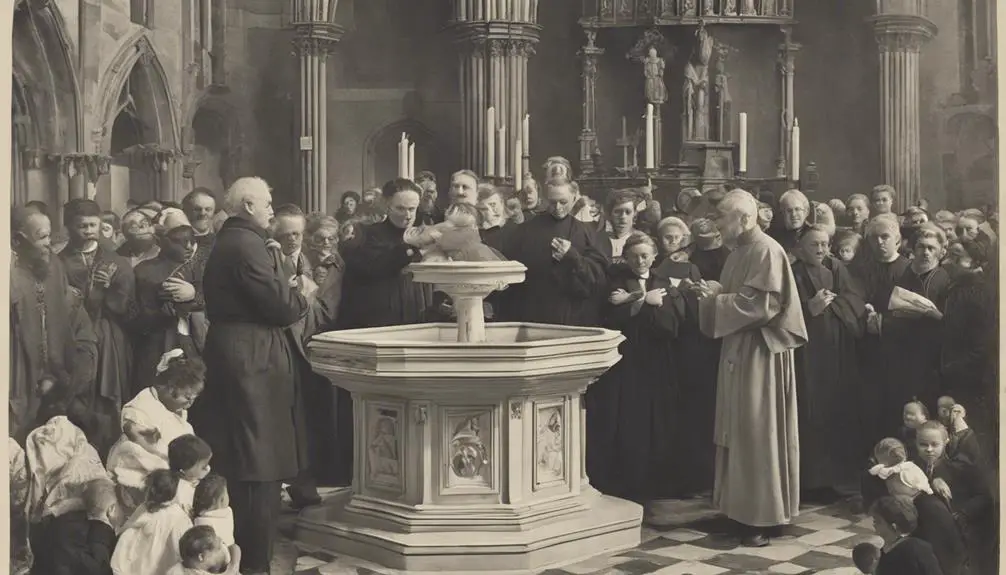Curious about church traditions not mentioned in the Bible? Uncover the surprising origins and reasons behind them.

Things Churches Do That Are Not in the Bible
You've probably noticed that most churches hold their main services on Sunday. But, did you know that neither the Old nor the New Testament explicitly designates Sunday as the day of worship?
In fact, the Bible mentions the Sabbath, or Saturday, as the day of rest and worship. So, why the switch to Sunday? The reasons behind this and other practices not directly referenced in the Bible might surprise you. Let's explore this further, shall we?
Key Takeaways
- Sunday worship and Christian holidays, while popular, are not explicitly mentioned or instructed within the Bible.
- Modern tithing practices, including the typical 10% contribution, are not mandated in the New Testament.
- Priestly celibacy, a practice from the 12th century, lacks a direct biblical foundation and is often viewed as a man-made tradition.
- Infant baptism, despite its prevalence, is not directly supported by biblical texts and remains a subject of debate among Christians.
The Concept of Sunday Worship

You might find it surprising that the practice of Sunday worship, a cornerstone of many Christian denominations today, finds no explicit mention in the Bible. The tradition of gathering on Sundays for religious services emerged not from direct biblical instruction but rather from the historical context of the early Christian community.
Emerging from a predominantly Jewish context, early Christians initially continued to observe the Jewish Sabbath on Saturdays. However, as Christianity began to distinguish itself as a separate faith, the first day of the week, Sunday, gained significance. This day was chosen to commemorate the resurrection of Jesus Christ, believed to have occurred on a Sunday.
This shift in tradition gave birth to various elements of Christian worship that are now commonplace, such as Sunday Sermons and Worship Music. These practices, although not explicitly prescribed in the Bible, have since become integral parts of Christian worship. Through Sunday Sermons, pastors and preachers provide spiritual guidance and interpret biblical teachings for their congregations. Worship Music, on the other hand, is used to facilitate collective praise and worship, and to create an atmosphere conducive to spiritual reflection and connection.
Practice of Church Tithing

Another tradition often associated with churches, yet not explicitly mandated in the Bible, is the practice of tithing. Let's delve into the 'Tithing Origins' and examine 'Modern Tithing'.
Traditionally, tithing was an Old Testament practice where one-tenth of a person's income was given to the temple or church. However, it's important to note that there's no New Testament scripture commanding this practice. In reality, the New Testament encourages giving from the heart, not out of compulsion or obligation.
Modern Tithing, on the other hand, is often interpreted as giving 10% of one's income to the church. Yet, this is not a biblically mandated percentage. It's a tradition that many churches have adopted, but it doesn't necessarily align with biblical teachings.
Here's a succinct comparison:
Tithing Origins |
Modern Tithing |
|
|---|---|---|
Biblical Mandate |
Old Testament |
None |
Percentage |
10% |
Varies |
Purpose |
Support of the temple/church |
Support of the church |
Motivation |
Obligation |
Often seen as obligation |
Infant Baptism Rituals

Moving from the financial customs of the church to its sacramental practices, let's scrutinize the ritual of infant baptism, an event not explicitly outlined in the Bible. Delving into the origins of baptism, it's crucial to note that it was initially practiced on adults who'd professed their faith in Jesus Christ, as documented in the New Testament. This ritual was a public declaration of their repentance and commitment to follow Christ.
Contrarily, infant baptism, as performed in many churches today, doesn't stem from such direct biblical precedent. Infants, obviously, can't profess faith or repentance. So, you may wonder, why do churches baptize infants?
This practice likely emerged as an attempt to ensure the salvation of the child should they pass away prematurely, tying into the implications for salvation. It's seen as a covenantal act, akin to the Old Testament practice of circumcision, signifying the infant's inclusion in God's covenant community. However, it's crucial to remember that the Bible neither explicitly mandates nor prohibits infant baptism. Therefore, it remains a debated practice, with different Christian denominations interpreting scripture and tradition in various ways.
Celibacy Among Clergy

Why, then, do some churches insist on celibacy among clergy, a requirement that isn't explicitly mentioned in the Bible? To delve into this, let's explore the Priestly Celibacy Origins and the Clerical Chastity Controversies.
Priestly celibacy, as you might know, has its roots not in biblical law, but in church tradition. It was canonized in the 12th century at the First Lateran Council as a means of ensuring that clergy devoted themselves entirely to spiritual matters. The idea was to mimic Christ, who was celibate, and to remove potential distractions, such as family ties and inheritances.
However, this has led to what's known as Clerical Chastity Controversies. Critics argue that celibacy isn't a divine mandate but a man-made rule, citing that several apostles, including Peter, were married. They also point out inconsistencies, such as the Eastern Orthodox Church's allowance of married priests.
Advent of Christian Holidays

Just as the practice of celibacy among clergy is rooted in church tradition, not biblical law, so too are many Christian holidays, which aren't directly mentioned in the Bible. The advent of these holidays, such as Easter and Christmas, has more to do with the evolution of Christian culture than with strict biblical commandments.
Let's examine the Easter origin. While the Bible does allude to the resurrection of Christ, which Easter commemorates, it doesn't specify the exact date or instruct to celebrate it annually. The date usually corresponds with Jewish Passover, but this isn't a biblical dictate. Similarly, the Christmas evolution has seen the holiday go from non-existence to a universal celebration, though the Bible doesn't mention the birth date of Christ.
To underscore these points:
- The Bible doesn't command the celebration of specific holidays
- The Easter origin doesn't have a fixed date in the Bible
- Christmas evolution didn't start with biblical instruction
- The establishment of these holidays is rooted in church tradition
- These holidays serve more as cultural markers than biblical mandates
You're reminded that while these practices enrich Christian culture, they're not explicitly biblical.
Frequently Asked Questions
What Is the Historical Origin of Church Choir Music and Is It Mentioned in the Bible?"
Choir music's evolution in churches dates back to the Middle Ages, but it's not specifically mentioned in the Bible. Early chants evolved into complex polyphonic pieces over centuries.
Musical instruments, while used in biblical times, weren't incorporated into church music until later. So, while you see choirs and instruments in today's churches, they're traditions developed over time, not directly biblical mandates.
Are the Architectural Design and Decoration of Churches Biblically Influenced?"
You're asking if the architectural design and decoration of churches are biblically influenced.
While the Bible doesn't dictate specific architectural styles, it's common to see sacred geometry and religious iconography in church design.
These elements aren't explicitly mentioned in scripture, but they're often used to convey religious themes and narratives.
Are the Practices of Confession and Penance Found in the Bible?"
You'll find that confession rituals and biblical penance aren't directly outlined in the Bible. Confession, as a formal, organized practice, isn't explicitly mentioned.
Penance, too, doesn't have clear biblical origins. Instead, these practices have evolved over time within the church. They serve as means of expressing remorse and seeking forgiveness, but their specific structures aren't found in biblical text.
What Is the Biblical Basis for the Hierarchy Within the Church, Such as Bishops, Priests, and Deacons?"
You're asking about the biblical basis for church hierarchy, like bishops, priests, and deacons. Some might point to Apostolic Succession, the belief that authority's passed from the original Apostles through successive bishops.
However, it's debatable if the Bible explicitly supports this. As for Clerical Celibacy, it's not a requirement in the Bible. These practices could be seen as church traditions developed over time, not necessarily grounded in scripture.
What Is the Scriptural Justification for the Observance of Lent?"
You may be wondering about the scriptural justification for observing Lent. While Lenten fasting doesn't directly appear in the Bible, it's often linked with Jesus' 40-day fast in the wilderness.
The Easter connection is significant as Lent serves as a preparatory period leading up to the celebration of Christ's resurrection. However, the practice as we know it, complete with Ash Wednesday and specific dietary restrictions, isn't explicitly laid out in scripture.
Conclusion
So, you've seen some practices churches engage in that aren't explicitly mentioned in the Bible. Sunday worship, church tithing, infant baptism, clergy celibacy, and Christian holidays aren't directly referenced. Yet, they've become integral parts of Christian culture.
It's important to remember that while these practices may not be Biblical per se, they've evolved to foster community, spirituality, and continuity in the faith. After all, faith isn't just about literal interpretations, but also about personal and communal expressions.



Sign up